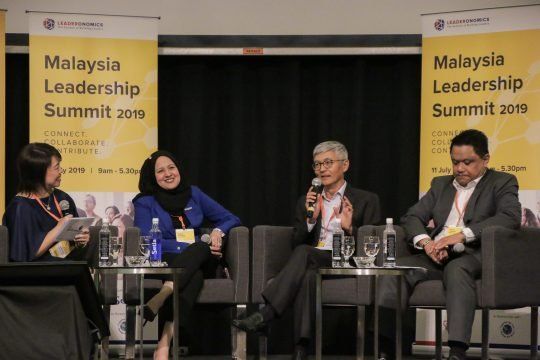The Netflix Of Knowledge

WITH 4.6 billion pieces of content produced daily, it might seem that our hunger for knowledge should be satisfied ‒ but information production and distribution is not the same as consumption, and it is not as simple as just putting information out there.
The problem is this: We are drowning in content but starving for knowledge and insights that can truly help us be more productive, collaborative, and innovative.
When we want to acquire useful knowledge, we have to search the web extensively, find experts by word-of-mouth, and scroll through various poorly designed, internal document sharing systems. This method is inefficient.
There should be a better solution to help users find what they need.
Such a solution would adapt to the user’s needs and learn how to make ongoing customised recommendations and suggestions through a truly interactive and impactful learning experience.
READ: What Makes You Employable? Knowledge, Transferable Skills And Personal Qualities Top The List
Borrowing from the entertainment industry to make learning easier
Before Netflix, Spotify, Reddit and similarly curated content apps, you had to go to numerous sources to find the shows, music, news, and other media you wished to view.
Now, the entertainment and media you actually want to consume is easily discoverable and personalised to your interests.
In many ways, the entertainment model is a good framework for knowledge management and learning development applications.
The solution for the learning and development industry would be a platform that can make education more accessible and relevant ‒ something that allows us to absorb and spread knowledge seamlessly.
Just as Netflix delivers entertainment we want at our fingertips, the knowledge and learning we need should be delivered where and when we need it.
The good news is that technologies are emerging to accomplish this.
Using artificial intelligence (AI) and machine learning, solutions available can now aggregate, curate, and personalise learning processes and content.

READ: 3 Things to Help People Develop Faster & Better
Company success depends on having a great learning culture
Based on the data, it is clear that Welch is correct.
According to Kevin Oakes, CEO of Institute of Corporate Productivity (I4CP), in high-performing organisations, employees are four times more likely to share newly acquired knowledge with co-workers.
It’s essential that employers create a learning culture ‒ one in which knowledge is more freely acquired, absorbed, and exchanged.
To do this, we need to deal with internal and external hurdles:
Internally, tacit knowledge is sitting inside the minds of your subject matter experts (SMEs). These experts should be easy to find and easy to engage based on their reputation and areas of expertise. There should also be a way for internal experts to publish important knowledge quickly, clearly, and share it with everyone who needs it in the organisation easily.
Externally, there is content everywhere, but it is difficult to know which content is good, authoritative, and relevant. This requires new ways to gather external content that are applicable and useful ‒ and safe ‒ for employees to consume.
A big part of the solution to these internal and external challenges is for organisations to embrace technology that does not just aggregate, curate, and customise learning content but also allows for the quick creation of content.
This is how a truly efficient learning culture is built.
What the Netflix of knowledge will look like
New AI-driven platforms will deliver the content your knowledge workers need at the right time and right place. The ideal learning and development solutions will use the following to help accomplish this goal:
- Aggregation: Optimal solutions will gather relevant content in one place; from a company’s Learning Management System (LMS) and intranet, to external providers and other preferred resources.
- Curation: Using AI and machine learning will be key to curate relevant and contextual content for your team at the right time and at the point of need.
- Personalisation: Ideal solutions will make increasingly personalised recommendations for learning content to suit your needs, based on the analysis of many factors.
- Creation: Your small and medium-sized businesses have tacit knowledge that must be unlocked. The best approach will allow your organisation to release and build your own content libraries quickly and conveniently.
Bringing it together
With as much as half of all current jobs going away in the next 10 to 12 years, let’s adopt the following mission: making learning accessible and feasible for every single employee. This will be the democratisation of knowledge at your company.
With personalised micro-learning and internal and external content more accessible than ever, let’s re-double our efforts to give our employees the skills and knowledge to thrive, which would have previously been time-consuming or impossible to obtain.
In the end, let’s use AI and machine learning to help advance our employees’ learning and career paths ‒ and not to replace them.
Rob Harles is managing director at Accenture Interactive. Karl Mehta is the founder and CEO of EdCast.inc. EdCast is partnering with Leaderonomics Digital to revolutionise learning in Asia. To connect with Karl, drop us an email at editor@leaderonomics.com.
Business
This article is published by the editors of Leaderonomics.com with the consent of the guest author.





